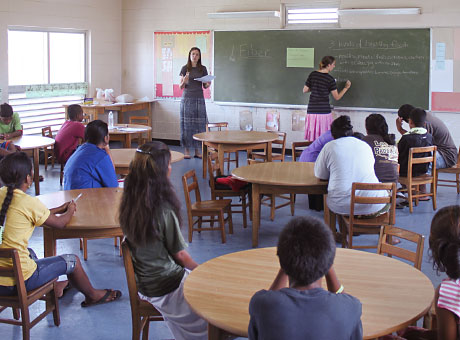
With support from FIHTM, students designed and implemented a diabetes prevention program in Majuro, Republic of the Marshall Islands.

With support from FIHTM, students designed and implemented a diabetes prevention program in Majuro, Republic of the Marshall Islands.
Interest in global health among U.S. medical students has grown dramatically. But, only a small fraction of students who work overseas during medical school will pursue careers in international health.
Faculty say it is clear, however, that early international experiences can have long-term impact on medical students and their future patients. Global training broadens students’ perspectives on disease prevention, care delivery and health care systems.
The Forum for International Health and Tropical Medicine (FIHTM) is a student-led group devoted to promoting interest and understanding of global health at the School of Medicine. With support from the dean’s office and the Washington University Medical Center Alumni Association, FIHTM annually sponsors one- to two-month overseas electives for 25 students and spring break experiences in the Navajo Nation and Central America.
FIHTM fellows participate in a wide range of research and clinical activities, such as studying tuberculosis in India, working on malaria prevention in rural Uganda and examining respiratory disease in stonemasons in Colombia.
“Many of our students say their international experience was life-changing,” said Gary Weil, MD, professor of medicine and faculty adviser to FIHTM. “They quickly learn to adjust to reduced resources and they see that culture, behavior and environment dramatically affect health, outcomes and the delivery of care.”
Working with diverse populations in low-resource settings requires students to rely heavily on physical exams and the patient’s history to make a diagnosis. These electives often strengthen “soft” skills, such as compassion and cultural sensitivity, which are valuable regardless of where students practice.
“It taught me how to establish a rapport with patients in spite of a language barrier and to see things from another cultural perspective,” said Christelle Samen, a second-year medical student who completed a rotation in Guatemala.
Student demand for these experiences outpaces the resources of FIHTM. Private philanthropy can support summer internships around the globe.
“There’s a growing interest in global health issues, and many of these issues are relevant to U.S. medical practice and policy,” Weil said. “Through FIHTM, the medical school is preparing young doctors who will work to change the world.”